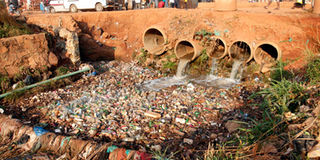Prime
We should do more to reduce plastic waste

What you need to know:
- The issue: Plastic waste
- Our view: Many groups and organisations, big and small, use used plastic materials to make crafts, jewellery and in some cases even shoes. A good number of people make a living from this.
The government through the Minister of Water and Environment, has asked plastic manufacturing companies to find alternative ways to manage their waste and to stop disposing it on the environment.
Mr Sam Cheptoris, the Minister for Water and Environment at the launch of the five-year Nature Recovery Plan, said they would use the Nema Act 2019 to make sure they adhere to it. This warning was carried in the Daily Monitor of Monday.
This warning should have been put into action much earlier. Plastic waste is very dangerous to the environment.
In Uganda, the problem increases each passing day. It is not difficult to see how bad the situation is, especially on rainy days when the flowing water dredges up waste, including plastic water bottles, polythene bags and other kinds.
The Nakivubo Channel also collects a lot of this waste, and pictures as well as videos of all the plastic rubbish that piles on its sides or at narrow points, have been shared variously on different platforms.
In 2018, Parliament passed the National Environment Bill, 2017 banning polythene bags below 30 microns following a recommendation from the Committee on Natural Resources.
The ban was enforced then and those who used those kinds of polythene bags to package goods for their customers had to think afresh.
This saw the rise of cloth and paper bags which are easy to recycle or get rid of without as much damage to the environment.
It was hard to buy or even see any polythene bag of that type for weeks after that. However, the kaveeras, as they are locally, known are now back.
As Mr David Duli, the country director of the World Wide Fund, said at the Nature Recovery Plan event, there is a need for a radical action to combat the damage these plastics wreak on water sources, land and marine life.
One of the ways is enforcing already existing laws that ban the use of certain plastics. It has worked before and a sustained effort can see it work very well.
In addition to that recycling of plastics should be encouraged and supported. Many groups and organisations, big and small, use used plastic materials to make crafts, jewellery and in some cases even shoes. A good number of people make a living from this.
Support in the form of marketing these initiatives can see the number of plastics which are thrown away, reduced.
The waste can be tackled. It must be tackled if we are to keep our environment safe.




